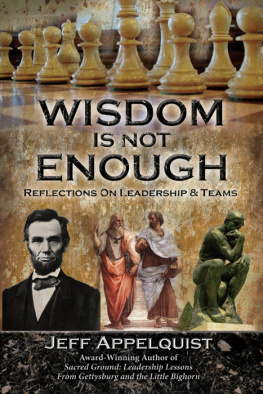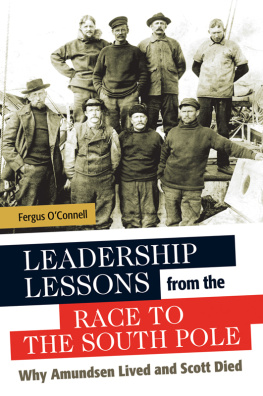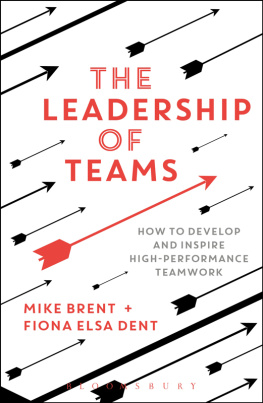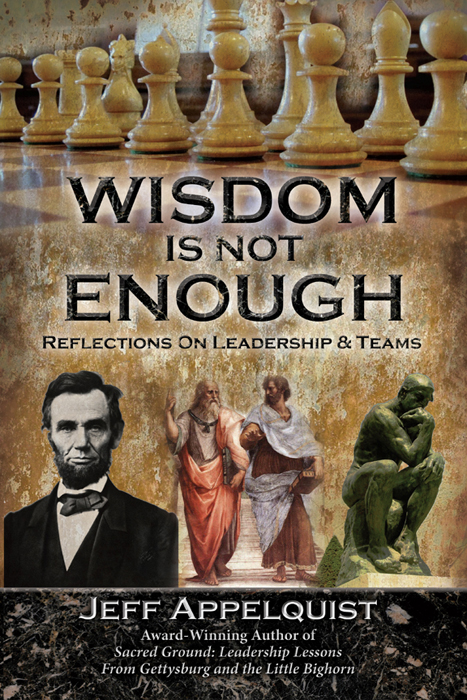
WISDOM IS NOT ENOUGH copyright 2011 by Jeff Appelquist. All rights reserved. No part of this book may be reproduced in any form whatsoever, by photography or xerography or by any other means, by broadcast or transmission, by translation into any kind of language, nor by recording electronicallyor otherwise, without permission in writing from the author, except by a reviewer, who may quote brief passages in critical articles or reviews.
eBook ISBN: 978-1-59298-518-0
Library of Congress Catalog Number: 2010943015
Cover and interior designs by Emsster Design Company

Beavers Pond Press, Inc.
7108 Ohms Lane, Suite 101
Edina, MN 55439-2129
(952) 829-8818
www.BeaversPondPress.com
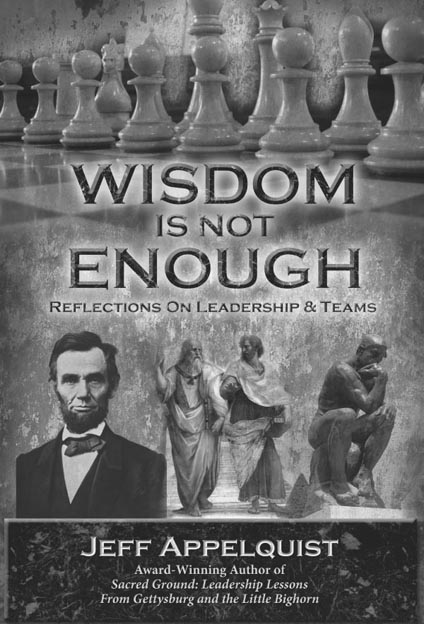
To my three best girls,
Faith, Anna & Lucia,
who are the light of my life
To accomplish great things,
we must not only act,
but also dream; not only plan,
but also believe.
Anatole France

CONTENTS

INTRODUCTION
Life is what happens to you while youre
busy making other plans
John Lennon
One afternoon in May 2009 my wife, Faith, sat at our kitchen counter reading one of the several local newspapers we receive free of charge at our home in the suburban Twin Cities of Minneapolis and St. Paul. Although I am a great reader of newspapers (I am a terrible New York Times and Wall Street Journal snob, and I love the Minneapolis Star Tribunes sports page), I only occasionally look at those hometown publications. I am lucky that she was taking a peek that day. Life has turned out differently as a result.
Faith shared with me a little blurb that described a new paper called the Dakota County Tribune Business Weekly that would be coming out soon in our area south of the Minnesota River. The editor was a fellow named Larry Werner, a long-time newspaper guy who is the general manager and editor of Thisweek Newspapers and the Dakota County Tribune. Larry was looking for subscribers to the new publication, and for business stories with a local flavor.
I had recently left the Best Buy Co. as part of a generous voluntary severance that Best Buy offered to all its corporate employees. I took the buyout to pursue my passion for history and to continue to build a company that Best Buy had already graciously supported me in starting, Blue Knight History Seminars, LLC. In my business, I take corporate teams out to great American battlefields and create an individual leadership and team-building experience for them. I draw on my knowledge of history but also on a quarter-century of experience as a Marine officer, practicing attorney, corporate executive and entrepreneur. I thought maybe Larry would be interested in doing a little feature on Blue Knight.
When I reached out, Larry went me one better, saying, How would you like to write a regular column on leadership and teams for the Business Weekly? My answer was enthusiastically affirmative. I wrote the first article that afternoon and sent it off to him. He said he liked it. I told him I thought I could crank one out every two weeks (I was in the midst of writing my first book at the time) and we were in business.
Wisdom Is Not Enough: Reflections on Leadership and Teams is a compilation of forty of the articles I wrote for Larry Werner and the Dakota County Tribune Business Weekly over eighteen months from the spring of 2009 to the fall of 2010, during a tremendously difficult time when both the American and world economies struggled mightily. I have divided the book into five parts: Decision Making, Strategy, Communication, Relationships, and Learning, with eight chapters in each section.
The essays all explore some facet of leadership or team dynamics but through a wide variety of lenses. Topics range from every type of modern-day business issue, challenge, and story, to the French and Indian War, the journey of Lewis and Clark, the American Civil War, Roald Amundsens trek to the South Pole, disasters at Mann Gulch, Montana, and high up on Mount Everest, the Cuban Missile Crisis, and the lessons learned from golf and chess. I find that leadership lessons are everywhere if we just look closely enough.
There are a number of key themes that run consistently through all five sections and all forty chapters of the book:
- Great leaders make good decisions. They virtually never have perfect information, but they are tough, smart, and know when to pull the trigger. This is probably the most important and difficult thing that leaders get paid to do.
- Great leaders see strategy as the evolution of a compelling common purpose that enables them and their organizations to maintain focus and effectively navigate their way through constantly changing circumstances.
- Great leaders are great communicators. They ensure that their teams understand their message by using multiple channels and erring on the side of overcommunication. They are sensitive to their audience, always honest, and they listen well.
- Great leaders know that nothing is possible without a foundation of strong, trusting relationships. They are sincere in their actions and genuinely care about the people they work and interact with. They spend time creating an environment that values and nurtures talent.
- Great leaders are brutally honest with themselves. They are their own worst critics. They are intense learners, always seeking, always recognizing that someone else may have a better answer than they do. They make constant adjustments and improvements based on what they learn.
- Finally, great leaders think differently, and they foster a diverse culture that permits others to think differently, too. Great leaders understand that the knowledge, skills, and abilities that have worked for them in the past might not work the next time. They know that wisdom is not enough. They are flexible, curious, and willing to try new approaches, even if the result is failure. Because they are great leaders, they will simply pick up, inspire their teams to follow, and try again.
These are the reasons great leaders and the teams they lead are successful. I wish each of you, my readers, great success in your own leadership journey.
Jeff Appelquist October 2010


